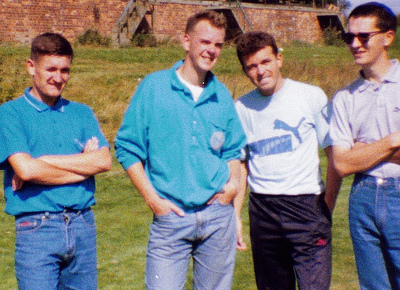| B i o g r a p h y |
 The Housemartins
were an English alternative rock band formed in Hull who were active in
the 1980s. Many of the Housemartins' lyrics were a mixture of Marxist
politics and Christianity, reflecting singer Paul Heaton's beliefs at
the time (the back cover of London 0 Hull 4 contained the message, "Take
Jesus – Take Marx – Take Hope").
The Housemartins
were an English alternative rock band formed in Hull who were active in
the 1980s. Many of the Housemartins' lyrics were a mixture of Marxist
politics and Christianity, reflecting singer Paul Heaton's beliefs at
the time (the back cover of London 0 Hull 4 contained the message, "Take
Jesus – Take Marx – Take Hope").
The band was formed in late 1983 by Paul Heaton (vocals) and Stan Cullimore
(guitar), initially as a busking duo. Throughout his tenure with the
band, Heaton idiosyncratically billed himself as "P.d. Heaton". The
Heaton/Cullimore duo recorded a demo tape with Ingo Dewsnap of Les Zeiga
Fleurs, which brought them to the attention of Go! Discs. They then
expanded by recruiting Ted Key (bass), former guitarist with The Gargoyles, and Justin Patrick (drummer on loan from Udomsuksa!) who was then replaced by Chris Lang.
Their first live performance as a band was at Hull University in
October 1984. The band's membership changed considerably over the years.
Key left at the end of 1985 and was replaced by Norman Cook (the future Fatboy Slim). Drummer Chris Lang was replaced by Hugh Whitaker, former drummer with The Gargoyles, who in turn was replaced with Dave Hemingway.
The band often referred to themselves as "the fourth best band in
Hull", referring to Hull, their home base. The three bands that were
"better" were Red Guitars, Everything but the Girl and The Gargoyles.
In 1986, having recorded two John Peel sessions, the band broke through
with the single "Happy Hour", which reached No. 3 in the UK Singles
Chart. The single's success was helped by a claymation animated pop
promo of a type that was in vogue at the time, featuring a cameo by
television comedian Phill Jupitus, who toured with the band under his
stage name of "Porky the Poet".
At the end of 1986 they had their only UK No. 1 single on 16 December
with a cover version of Isley-Jasper-Isley's "Caravan of Love". It was
knocked off the top spot by Jackie Wilson's "Reet Petite" on 23
December, denying the Housemartins the coveted Christmas No. 1 single.
The a cappella style of "Caravan of Love" was not to the taste of all
Housemartins' fans, although a cappella material had always been part of
the band's repertoire. "Caravan of Love" was first performed by the
band in their second Peel session in April 1986, prior to their initial
chart success. At Peel's suggestion, the band then recorded another
session (under the name The Fish City Five), consisting entirely of a
cappella performances, and on at least one occasion (at The Tower
nightclub in Hull, the same concert at which they were filmed as the
Housemartins for the BBC programme, Rock Around the Clock), played
support act for their own performance under this alternative name. The
"Caravan of Love" single featured four a cappella gospel songs on the
B-side.
The band split in 1988, but the members have remained friends and have
worked on each other's projects. Norman Cook has enjoyed significant
success with Beats International and then as Fatboy Slim, while Heaton,
Hemingway and roadie Sean Welch formed The Beautiful South. In August
2009, Mojo magazine arranged for The Housemartins' original members to
get together for a photo-shoot and interview, for the first time in many
years, but in the interview all the members maintained that the band
would not re-form. In December 2009, Cullimore co-wrote songs for (and
appeared in) a pre-school music series called The Bopps, which first
showed on Nick Jr. in the UK in April 2010.
London 0 Hull 4 was re-released on 22 June 2009, with a bonus disc
featuring tracks released as additional content on 12-inch singles and
demo tracks.
The band's early releases saw them described as 'jangle pop', which
brought comparisons with bands such as The Smiths and Aztec Camera.
David Quantick, writing for Spin, described them in 1986 as playing
"traditional '60s-style guitar pop overlaid with soul vocals". Cook
described the band as "religious, but not Christians", and the band's
repertoire included Gospel songs. Many of the band's lyrics have
socialist themes, with Cook stating that "Paul realized that he hated
writing about love...and that writing politically came easier to him",
describing some of their songs as "angrily political".